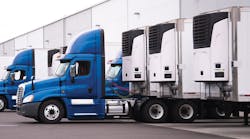Two U.S. legislators are hoping to freeze out diesel-powered transport refrigeration units (TRUs).
Massachusetts Sen. Edward J. Markey and U.S. Rep. Yvette D. Clarke (NY-09), both Democrats, recently introduced The FREEZER (Fostering and Realizing Electrification by Encouraging Zero Emission Refrigeration) Trucks Act, which they say would reduce harmful emissions from heavy-duty refrigerated trucks.
The lawmakers insist their plan would combat the climate crisis and reduce local air pollution by creating a grant program at the U.S. Environmental Protection Agency (EPA) to electrify diesel-powered TRUs on commercial trucks and vans. Medium- and heavy-duty vehicles contribute more than 20% of greenhouse gas emissions from the transportation sector, they argue, and emit higher levels of particulate matter and smog-forming pollutants than passenger vehicles.
“Diesel emissions are a deadly contributor to air pollution in our most overburdened communities,” Markey said. “We cannot continue to allow diesel refrigerated trucks to idle 24 hours a day, 365 days a year when there are clean alternatives available. Now is the time to combat environmental injustice and reduce emissions everywhere, beginning with the dirtiest polluters in the highest-risk communities as we continue to fight the colliding crises of climate change, air pollution, and the ongoing respiratory pandemic.”
Refrigerated trucks are essential to transporting food and other temperature-sensitive products, but trailers equipped with diesel refrigeration units continue to burn fuel even when parked to stay cool, the legislators continued. Electric TRUs that can be plugged in when stationary emit fewer greenhouse gases and fully eliminate the on-site air pollutants that disproportionately affect overburdened communities and contribute to lung and cardiovascular conditions.
The FREEZER Trucks Act would authorize $30 million in funding to be used to convert TRUs powered by independent diesel engines to electric-powered units, and install the charging infrastructure needed to support electrification. Importantly, the grant program would focus on projects that can maximize public health benefits by serving communities that currently experience the highest levels of diesel pollution across the nation.
According to the bill, an EPA administrator would establish a pilot program to award “grants, rebates and low-cost revolving loans” for certain projects, including replacing or retrofitting existing diesel-powered TRUs; and purchasing and installing shore power infrastructure or other equipment that enables TRUs to connect to electric power.
A copy of the legislation is available here.
“Refrigerated trucks are ubiquitous in cities like Brooklyn, where they can be seen and heard at all hours of the day and night making deliveries,” Clarke said. “While these trucks are a vital component of regional and local economies, they are also major sources of climate-warming emissions and local air pollution in the communities they serve.
“That is why my legislation with Sen. Markey will help replace dirty refrigeration units with clean technology that is better for the environment and our neighborhoods, particularly in communities most impacted by local air pollution.”



